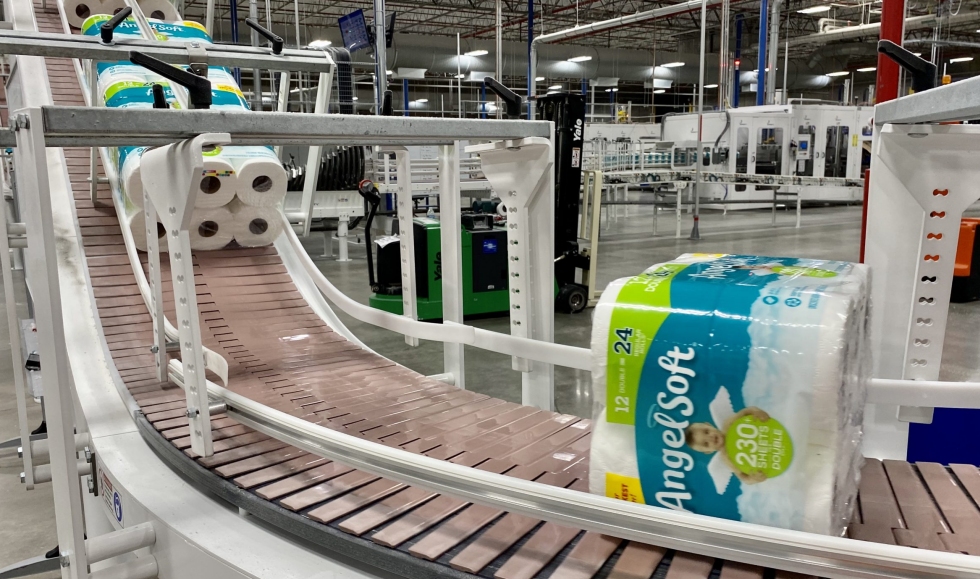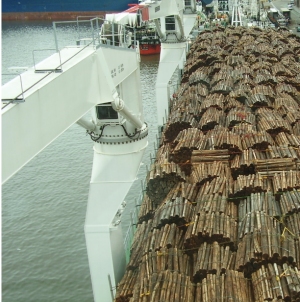|

Effects of the COVID-19 Pandemic on Brazil’s Forest Sector
By Marcelo Schmid, Manager of Forest2Market's operations in Brazil
April 27, 2020 - Some players in the Brazilian forest-based industry are doing well in the face of the economic crisis caused by the coronavirus. But while the country’s pulp sector has largely been unaffected, the packaging sector has been hit hard.
Pulp Sector Reduces Inventories
Brazil is the largest global producer of market pulp and this segment is undoubtedly the most important for the Brazilian forest supply chain. While the pulp segment experienced a drop in foreign demand and exports in 2019, this created an increase in inventories among the major Brazilian producers.
The coronavirus pandemic has caused the global consumption of toilet paper to increase worldwide, which has helped to reduce large inventories and normalize production. Although this increase in consumption has been driven by a temporary sense of “panic,” the general feeling is that a market shift has occurred and the consumption of toilet and tissue paper will increase in the future as overall health and hygiene habits have changed.
Lumber Production Expected to Return to Normal in May
The situation for lumber and panel producers varies and depends primarily on the end market for each wood product. Some companies are reporting a reduction in shifts and layoffs due to reduced demand, however, others pointed out that the operations have not yet suffered a significant impact.
It is also clear that the economic effects on manufacturing operations have not been caused by structural market problems (i.e. lack of demand), but rather by restrictive measures put in place by municipal and state governments. As such, many of the clients we have consulted predict that activity will spike in May and head back towards “normal.” In general, popular export products, such as frames and related components, are less affected than products sold into the domestic market and the retail consumer sector.
Packaging Sector Suffers Greater Impact
Speaking of the domestic market, the Brazilian packaging sector represents the segment of the forest-based industry that is suffering the most impact at the moment, and it is not very difficult to understand why. The packaging segment is closely linked to the consumption of different finished products such as food, footwear, household appliances, among others. Since the consumption of various goods has been severely affected in recent weeks due to the reduction in consumer buying habits, the demand for packaging that accompanies these products has also been drastically reduced.
Plywood Sector May be Affected if Quarantine Continues
The civil construction segment, another major consumer of forest-based products, appears not to have been excessively affected by the pandemic. The sector has been recovering after a period of decline. However, with the projected decrease in construction activity on the horizon combined with restrictive “shelter in place” measures across the country, the outlook for April and May is bleak. If the quarantine lasts for another two months, the issue will begin to impact specific sectors within the forest supply chain, such as plywood manufacturers.
SOURCE: Forest2Market |
|
|

Metsä Fibre and Ahlstrom-Munksjö Collaborating on Responsible Sourcing of Wood
April 30, 2020 - Metsä Fibre and Ahlstrom-Munksjö continue the collaboration by focusing on responsible wood sourcing. Ahlstrom-Munksjö, as a significant wood pulp consumer, and Metsä Fibre, as the world’s leading producer of bleached softwood pulp, have a particular responsibility to advance environmental performance and sustainability throughout their operations and supply chains.
“We are committed to contributing to United Nations Sustainable Development Goals by reducing negative impact across the value chain. The collaboration with both the suppliers and customers is very important in developing and implementing our sustainability strategy, and thereby achieving these goals,” says Heli Nykänen, Manager, Group Sustainability and Capital Investments.
The project that started in 2019 has mainly focused on responsible wood sourcing in the value chain from the forest to the end-products. As part of the partnership, the companies organized a supplier visit in Finnish Lapland for 3M and Nestlé which are among Ahlstrom-Munksjö’s key customers. The in-depth visit was led by Earthworm Foundation who is 3M and Nestle’s Policy implementation partner. The visit covered the Metsä Group’s wood procurement practices in the Lapland area as well as its impact on indigenous people. During the visit, the participants had an opportunity to discuss local forestry practices with all relevant stakeholders.
“Responsible forest management and wood procurement practices are essential to our operations. We are proud of our strong traditions in Finnish forest management as well as our actions in promoting responsible forestry practices,” says Vesa Junnikkala, Director Sustainability, from Metsä Group Wood Supply and Forest Services.
Ari Harmaala, SVP Sales and Customership, Metsä Fibre, added, “At Metsä Fibre, we want to create value for our customers and their business. We have ambitious 2030 sustainability targets, and we see that proactive sustainability collaboration with customers and other stakeholders is beneficial for the whole value chain. Sustainability and responsibility are an integral part of everything we do, and last year our strong commitment in sustainability was recognised in the international EFQM quality competition, where we won the Outstanding Achievement for Sustainability Award and reached the EFQM rating Recognised for Excellence 6 Stars.
“Both Ahlstrom-Munksjö and we are highly committed to driving responsibility not just in our own operations but also within the industry.”
About Ahlstrom-Munksjö
Ahlstrom-Munksjö is a global leader in fiber-based materials, including filter materials, release liners, food and beverage processing materials, decor papers, abrasive and tape backings, electrotechnical paper, glass fiber materials, medical fiber materials and solutions for diagnostics, as well as a range of specialty papers for industrial and consumer end-uses. For further information, visit: www.ahlstrom-munksjo.com.
About Metsä Fibre
Metsä Fibre, part of the Metsä Group, is a leading producer of bioproducts and bioenergy. Metsä Fibre produces pulp and other bioproducts at four mills in Finland: Joutseno, Kemi, Rauma and Äänekoski; and also has six sawmills: Kyrö, Lappeenranta, Merikarvia, Renko and Vilppula (in Finland) and in addition, Metsä Svir sawmill in Russia. For further information visit: www.metsafibre.com.
SOURCE: Metsä Fibre |
|

Don't Worry: TP Is Made in the USA
Georgia producers meeting toilet paper demand
April 28, 2020 - As Americans adhere to social distancing guidelines amid COVID-19 concerns and stock up for extended periods at home, shoppers are repeatedly having difficulty stocking up on an essential item - toilet paper.
Images and videos shared across social media show long retail lines, panicked consumers and depleted stocks of bathroom tissue. However, many may not realize this everyday necessity is largely manufactured in the U.S., with Georgia featuring more acreage devoted to timberland than any other state.
Although recent demand has been higher than normal, household paper manufacturers, many of which have major operations in Georgia, have been adjusting production schedules to ensure a steady flow of products reaches store shelves.
For example, the Atlanta-based manufacturer Georgia-Pacific, maker of Quilted Northern and Angel Soft brand bathroom tissue and one of the world's largest suppliers of paper products, has seen significant demand in their retail business, specifically for tissue and towel products, and expects to see those trends continue for the time being.
"As a company, we have our teams working cooperatively and quickly together to deliver as much product as we possibly can," said Eric Abercrombie, spokesman for Georgia-Pacific. "We are working hard to maximize the number of deliveries we can load and ship out of our facilities. In fact, a few weeks ago our mills and regional distribution centers managed to ship out around 120 percent of normal capacity, and we're also working with customers to have direct shipments when possible to reduce distribution time."
International Paper is another major supplier operating in Georgia. In a statement to International Paper's global team members, CEO Mark Sutton said the company plays a critical role in the supply chain. Sutton added that plants are operating safely.
"There has never been a more important time for International Paper to deliver the products we make," Sutton said.
Paper products are a major economic driver in the U.S., especially in Georgia, where the forestry industry generates $36.8 billion in annual economic impact.
The state is home to nearly 1,400 forest product manufacturers and consistently ranks as a top producer of pulp and paper in the U.S. Major forest products importers and exporters through Georgia's ports include Interfor, International Paper Company, Georgia-Pacific, Rayonier, FR Meyer's Sohn and Georgia Paper.
As the No. 1 East Coast port for forest products, the Georgia Ports Authority handles about a quarter of U.S. forestry exports each year.
Georgia's deepwater ports and inland barge terminals support more than 439,000 jobs throughout the state annually and contribute $25 billion in income, $106 billion in revenue and $2.9 billion in state and local taxes to Georgia's economy. The Port of Savannah handled 8.5 percent of U.S. containerized cargo volume and 10 percent of all U.S. containerized exports in FY2017.
SOURCE: Georgia Ports |
Imported Forest Products to China Dropped by $750 Million in January and February
 April 9, 2020 - The coronavirus epidemic in China has resulted in sharply reduced importation of forest products in early 2020. During January and February, the import value of logs, lumber, pulp and wood chips totaled 4.6 billion dollars. This was down 26% and 14%, from the same periods in 2018 and 2019 respectively, reports the Wood Resource Quarterly (WRQ). April 9, 2020 - The coronavirus epidemic in China has resulted in sharply reduced importation of forest products in early 2020. During January and February, the import value of logs, lumber, pulp and wood chips totaled 4.6 billion dollars. This was down 26% and 14%, from the same periods in 2018 and 2019 respectively, reports the Wood Resource Quarterly (WRQ).
From 2019 to 2020, the biggest percentage declines were seen in softwood lumber (-26% y-o-y) and softwood logs (-20% y-o-y). The import value for wood pulp fell the most (just over 300 million dollars y-o-y) followed by softwood lumber, which was down 190 million dollars.
Softwood Lumber
Softwood lumber imports to China were estimated to be 1.2 million m3 in February 2020, the lowest monthly volume in four years. The two largest lumber suppliers, Russia and Canada, continued to be the major sources for lumber.
While Russian volumes were down 16% the first two months of 2020 as compared to the previous year, this decrease, however, did not have an adverse effect on the market share, as Russia actually saw an increase in their percentage of the market — a small jump from 57% in early 2019 to 59% in early 2020. Canada's share fell substantially, from 24% to 10% during the same period.
Another noteworthy change in the past two years has been the expanded presence of lumber coming from Europe into the Chinese market, both in volumes and market share. European lumber accounted for about 18% of total imports in early 2020, up from 8% in 2018.
Softwood Logs
During January and February of 2020, China imported 5.1 million m3 of softwood logs, down from almost 5.7 million m3 in the same period in 2019 and the total import value fell from 800 million dollars to 640 million dollars.
Record high log inventories (over 7 million m3) at Chinese ports, reduced demand for forest products as a consequence of the coronavirus, and labor shortages at ports and wood processing facilities have resulted in sharp declines of log imports in 2020. All log-supplying countries reduced shipments dramatically with the exception of New Zealand (only down 1% y-o-y) and Central Europe (Germany and the Czech Republic were up 200% and 320% y-o-y) where large volumes of beetle-killed timber were available. Total import volumes to China in February 2020 were the lowest since February 2016.
Hardwood Chips
The only major product that showed increases in import volume from early 2019 to early 2020 was hardwood chips, with a gain of 11% y-o-y. This was driven by higher production of predominantly hygiene paper products in January and February, and the expectation that this sector would continue to be strong into the second quarter, reports the WRQ. Shipments from Vietnam and Chile jumped about 20% y-o-y, while Australia shipped 3% less in the first two months of 2020, as compared to the same period in 2019.
Wood Pulp
The import volume of wood pulp increased by almost 20% y-o-y during the first two months of 2020, with particular noteworthy rises in shipments from Indonesia, Canada, Finland and Sweden. However, the import value fell by 308 million dollars (-14% y-o-y) as a result of substantially lower prices for market pulp in early 2020.
Wood Resource Quarterly is published by Wood Resources International, which specializes in evaluations of global forest resources, raw material markets (logs, wood chips and biomass), forest products trade and wood costs worldwide.
SOURCE: Wood Resources International LLC |
Domtar Announces Temporary Idling of Paper Capacity to Address COVID-19 Related Business Impact
 April 6, 2020 - Domtar Corporation today announced that it will temporarily idle the operations of its Kingsport, Tennessee mill and the A62 paper machine at its Ashdown, Arkansas mill for three months in response to the unforeseeable business conditions driven by the COVID-19 pandemic. April 6, 2020 - Domtar Corporation today announced that it will temporarily idle the operations of its Kingsport, Tennessee mill and the A62 paper machine at its Ashdown, Arkansas mill for three months in response to the unforeseeable business conditions driven by the COVID-19 pandemic.
The temporary shutdown will reduce Domtar's uncoated freesheet paper production capacity by approximately 144,000 short tons over the three months' period. As a result, Domtar will lay off approximately 304 employees at its Kingsport mill and 142 employees at its Ashdown mill.
"The COVID-19 pandemic is having a negative impact on communication paper demand, with offices, businesses and schools still closed in a large part of our markets," said John D. Williams, President and Chief Executive Officer. "Given the evolving market conditions, we are taking the appropriate steps to optimize our operations, which will ensure that we remain an agile, reliable partner to our customers. We regret the impact these temporary shutdowns will have on our Kingsport and Ashdown employees and their families, and we are doing everything we can to support them during this time."
Domtar's other facilities remain fully operational, and continue to ship products to all states and provinces without disruption. Domtar is committed to operating its business as efficiently as possible in order to meet the needs of its customers, while maintaining the health and safety of its employees.
SOURCE: Domtar |
|
|